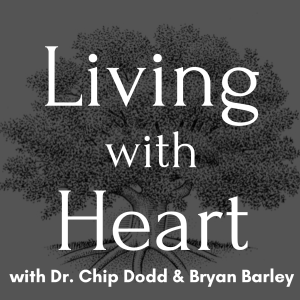
Living with Heart: From Birth to Death
Education:Self-Improvement

Click here to read the episode highlights.
The "Living with Heart" Podcast is brought to you by Chip Dodd Resources (www.chipdodd.com) and The Voice of the Heart Center (vothcenter.com). Contact Bryan Barley for coaching at bryan@vothcenter.com.
Episode Highlights:
“Confusion about Toxic Shame and Guilt”
Codependency is not your fault, but it is your responsibility to deal with. Even though we have been “taught” to rid ourselves of how God made us, it does not give us permission or the right to stay there. It is a sickness that we have, and we have the responsibility to find the healing.
Codependency is the loss of how God made us, with self-awareness, self-trust, self-care, being sensitive to our own true feelings, loss of learning how to respond to our feelings in a healthy way; it is the loss of self-worth—given over to the needs of significant others who are uncomfortable with themselves, or self-rejecting.
Codependency recovery is not selfishness; it is “Self-fullness.” Self-fullness is having enough of who God created us to be that we have the ability to give our gifts to a world in need.
The need to belong and matter is so powerful that we are going to find a way to get those needs met—through suppression or expression.
Expression has to be grown and matured, so codependency recovery does take time and investment.
Each of the symptoms that we have discussed in this podcast is from the work of Timmen Cermak, in his book Diagnosing and Treating Codependency. The descriptions and following work are from my own experiences.
Codependency is pervasive, a pandemic, and all the relief-seeking addictions we can name have their origin and influence in codependency.
Symptom #12 Confusion About Toxic Shame and Guilt
Toxic shame is grounded in never being able to do anything “right enough,” or be right enough to be loved, or have the “right” to receive mercy.
In toxic shame the confusion between shame and guilt is birthed in the mistaken belief that I should be able to not mess up; not make mistakes; should not have to need mercy; should be able to be perfect. It is the belief that only perfect people can be loved. If I am not perfect, I am “worth-less” and cannot be loved.
Click here to continue reading the episode highlights.
More Episodes
 2024-10-15
2024-10-15
 685
685
 2024-10-08
2024-10-08
 725
725
 2024-09-24
2024-09-24
 810
810
 2024-09-17
2024-09-17
 825
825
 2024-09-10
2024-09-10
 882
882
 2024-09-03
2024-09-03
 956
956
 2024-08-20
2024-08-20
 874
874
 2024-08-13
2024-08-13
 1.1k
1.1k
 2024-08-06
2024-08-06
 498
498
 2024-07-30
2024-07-30
 509
509
 2024-07-23
2024-07-23
 487
487
 2024-07-16
2024-07-16
 586
586
 2024-07-09
2024-07-09
 663
663
 2024-07-02
2024-07-02
 610
610
 2024-06-25
2024-06-25
 637
637
Create your
podcast in
minutes
- Full-featured podcast site
- Unlimited storage and bandwidth
- Comprehensive podcast stats
- Distribute to Apple Podcasts, Spotify, and more
- Make money with your podcast
It is Free
- Privacy Policy
- Cookie Policy
- Terms of Use
- Consent Preferences
- Copyright © 2015-2024 Podbean.com





